DFS in Alabama Illegal According to AG
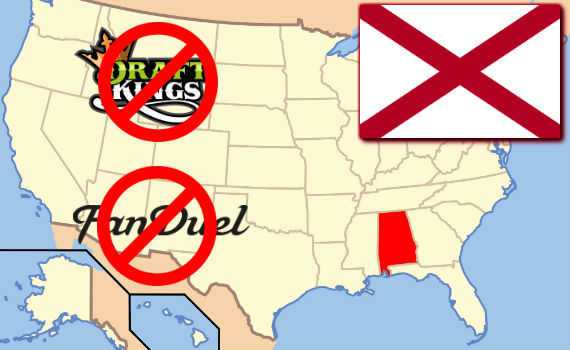
State Attorney General Luther Strange claimed DFS in Alabama illegal and sent letters for daily fantasy sports operators DraftKings and FanDuel demanding to stop their respective businesses in the Heart of Dixie.
After declaring DFS illegal in Alabama, AG Strange ordered DraftKings and FanDuel to stop their real money operation in the state by May 1. He argued that real money daily fantasy contests qualify as illegal gambling according to Alabama gambling laws.
Chance influences the contests, so DFS in Alabama illegal
Latest gambling news quoted Strange, saying, “As Attorney General, it is my duty to uphold Alabama law, including the laws against illegal gambling. Daily fantasy sports operators claim that they operate legally under Alabama law. However, paid daily fantasy sports contests are in fact illegal gambling under Alabama law.”
Alabama AG tells FanDuel & DraftKings to stop paid #DFS by May 1 https://t.co/592HIMSxWO
— Darren Heitner (@DarrenHeitner) April 6, 2016
According to Alabama gambling laws, illegal gambling also occurs when somebody makes a wager on a contest of chance, even if skill is involved. Strange argues that skill is needed to assemble a fantasy sport team indeed, but the bettors have no control over the performance of their fantasy players. Any unforeseen event like an injury can influence player performance, so these contests rely on chance and therefore was claimed DFS in Alabama illegal gambling.

State Attorney General Luther Strange claimed DFS in Alabama illegal and sent letters for daily fantasy sports operators DraftKings and FanDuel demanding to stop their respective businesses in the Heart of Dixie.
After declaring DFS illegal in Alabama, AG Strange ordered DraftKings and FanDuel to stop their real money operation in the state by May 1. He argued that real money daily fantasy contests qualify as illegal gambling according to Alabama gambling laws.
Chance influences the contests, so DFS in Alabama illegal
Latest gambling news quoted Strange, saying, “As Attorney General, it is my duty to uphold Alabama law, including the laws against illegal gambling. Daily fantasy sports operators claim that they operate legally under Alabama law. However, paid daily fantasy sports contests are in fact illegal gambling under Alabama law.”
Alabama AG tells FanDuel & DraftKings to stop paid #DFS by May 1 https://t.co/592HIMSxWO
— Darren Heitner (@DarrenHeitner) April 6, 2016
According to Alabama gambling laws, illegal gambling also occurs when somebody makes a wager on a contest of chance, even if skill is involved. Strange argues that skill is needed to assemble a fantasy sport team indeed, but the bettors have no control over the performance of their fantasy players. Any unforeseen event like an injury can influence player performance, so these contests rely on chance and therefore was claimed DFS in Alabama illegal gambling.
NBA Commissioner Calls for Regulation of DFS, Sports Betting
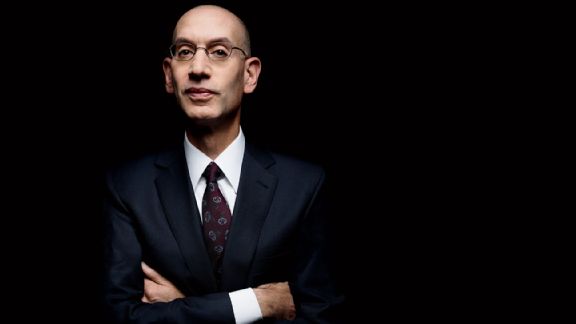
Said Silver on FiveThirtyEight’s Hot Takedown podcast: “My view is that daily fantasy should be a regulated industry in New York and elsewhere, and I think ultimately that should be a decision for the voters.”
Silver is the first head of a major sports league to comment on the ongoing DFS controversy, and the most outspoken advocate of legal sports gambling. He made his opinion first known in October, when he told ESPN that the NBA is not considering “withdrawing or backing off our relationship with the [DFS] industry”, and that “it’s something that we’re deeply engaged in on the broader subject of daily fantasy-slash-sports betting.” He also had written a New York Times piece about why sports betting should be legalized shortly after entering into an equity deal with FanDuel.
Does the NBA commissioner consider DFS gambling?
The most pressing question in American gambling laws right now is whether DFS is a game of skill, or of chance. Silver declined to discuss whether he believes that DFS constitutes as gambling or not, but did say that the legalization and regulation of both DFS and sports gambling would be in the best interest of major sports leagues.
Said the NBA commissioner: “One of the reasons I’ve been pushing to legalize sports betting is not because that I’m necessarily an advocate of sports betting, it’s because all the research shows that it’s a multi-hundred-billion dollar business just in the United States right now.”
“In terms of the integrity of the sports league, it’s only bad news for us when it continues to remain underground… [to] the extent there are fantasy sites or flat-out betting sites, where consumers identify themselves by putting credit cards in and then can be tracked the same way the stock market can track buying and selling, then that’s much healthier for the leagues.”


Said Silver on FiveThirtyEight’s Hot Takedown podcast: “My view is that daily fantasy should be a regulated industry in New York and elsewhere, and I think ultimately that should be a decision for the voters.”
Silver is the first head of a major sports league to comment on the ongoing DFS controversy, and the most outspoken advocate of legal sports gambling. He made his opinion first known in October, when he told ESPN that the NBA is not considering “withdrawing or backing off our relationship with the [DFS] industry”, and that “it’s something that we’re deeply engaged in on the broader subject of daily fantasy-slash-sports betting.” He also had written a New York Times piece about why sports betting should be legalized shortly after entering into an equity deal with FanDuel.
Does the NBA commissioner consider DFS gambling?
The most pressing question in American gambling laws right now is whether DFS is a game of skill, or of chance. Silver declined to discuss whether he believes that DFS constitutes as gambling or not, but did say that the legalization and regulation of both DFS and sports gambling would be in the best interest of major sports leagues.
Said the NBA commissioner: “One of the reasons I’ve been pushing to legalize sports betting is not because that I’m necessarily an advocate of sports betting, it’s because all the research shows that it’s a multi-hundred-billion dollar business just in the United States right now.”
“In terms of the integrity of the sports league, it’s only bad news for us when it continues to remain underground… [to] the extent there are fantasy sites or flat-out betting sites, where consumers identify themselves by putting credit cards in and then can be tracked the same way the stock market can track buying and selling, then that’s much healthier for the leagues.”

It’s Like Gambling: NCAA Rules Against Fantasy Football
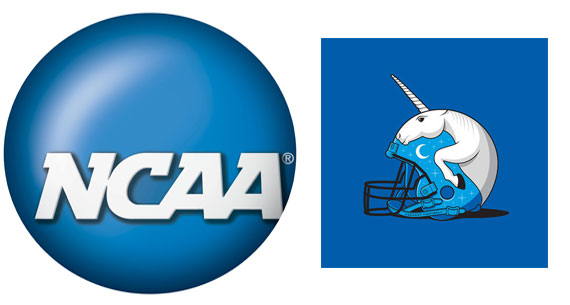
NCAA rules against fantasy football threatens participating athletes with a year of suspension.According to Oliver Luck, the executive of the college sports organization and father of Indianapolis Colts quarterback Andrew Luck, entry-fee daily fantasy sports qualify as sports gambling, which is prohibited for NCAA players. This means that athletes playing fantasy games for money violate the organization’s gambling laws. They will automatically lose one year of their eligibility if caught playing DraftKings or FanDuel.
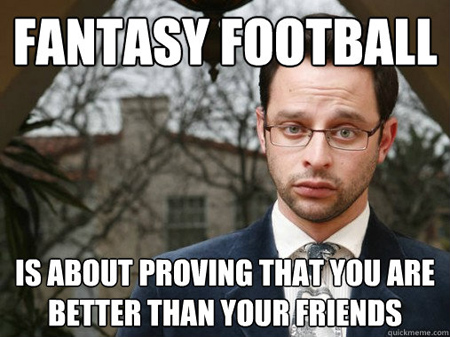
Like the NFL and unlike the NBA and the MLB, NCAA strongly opposes sports gambling. But the amateur sports organization went one step further recently. They declared that entry-fee daily fantasy sports are also a form of sports gambling.
Though the major leagues all embraced these games – or just did not act to prevent them growing – NCAA has a firm stance against the matter. They argue that it is a threat towards the integrity of the game and amateur players are far more vulnerable like their pro colleagues.
Since there is big money in this business, it is obvious that at some point it will worth it for someone to try to influence the result of college sports scores to make some cash. The majority of the NCAA athletes have no shot at professional careers at all. So, why not try to earn some extra income towards the end of their college careers?
Huffingtonpost.com: Why The NCAA Is So Uneasy About The Rise Of Daily Fantasy Sports
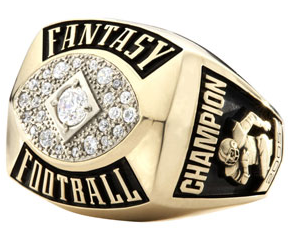
This champion ring is just as…real as fantasy football
A survey from 2004 found that 1.4% of college athletes changed their performance in order to influence the result of a game. According to a 2012 survey, 4.6% of college players were approached by outsiders for confidential information. The latest big point-shaving scandal in NCAA basketball from 2004 to 2006 also emphasizes the threats towards the integrity of college sports.
Taking all this into account, it is no wonder that NCAA rules against fantasy football are the same as against traditional forms of sports gambling. However, many experts of gambling facts consider this as an outdated and hypocritical approach. Labeling all this as gambling and prohibiting it, won’t solve the problem.
A few players might get caught and would be handed a year suspension, but this thing is so widespread, that it won’t avert athletes from playing. The 2012 survey that was mentioned above, found that 50% percent of NCAA athletes played fantasy sports. It was three years ago, and these games grew massively since then…
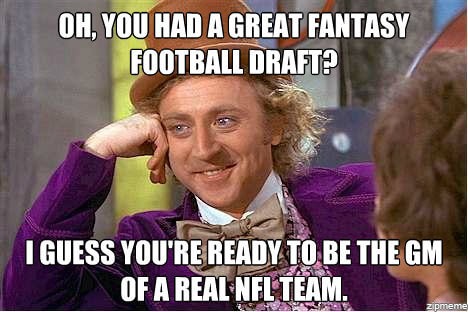
The NCAA want to ban college games from the catalogues of daily fantasy sports sites. Though this would be a better solution, it is hard to see happening anytime soon. And even if they would be able to get a gambling regulation like this implemented, all this would continue in illegality…


NCAA rules against fantasy football threatens participating athletes with a year of suspension.According to Oliver Luck, the executive of the college sports organization and father of Indianapolis Colts quarterback Andrew Luck, entry-fee daily fantasy sports qualify as sports gambling, which is prohibited for NCAA players. This means that athletes playing fantasy games for money violate the organization’s gambling laws. They will automatically lose one year of their eligibility if caught playing DraftKings or FanDuel.

Like the NFL and unlike the NBA and the MLB, NCAA strongly opposes sports gambling. But the amateur sports organization went one step further recently. They declared that entry-fee daily fantasy sports are also a form of sports gambling.
Though the major leagues all embraced these games – or just did not act to prevent them growing – NCAA has a firm stance against the matter. They argue that it is a threat towards the integrity of the game and amateur players are far more vulnerable like their pro colleagues.
Since there is big money in this business, it is obvious that at some point it will worth it for someone to try to influence the result of college sports scores to make some cash. The majority of the NCAA athletes have no shot at professional careers at all. So, why not try to earn some extra income towards the end of their college careers?
Huffingtonpost.com: Why The NCAA Is So Uneasy About The Rise Of Daily Fantasy Sports

This champion ring is just as…real as fantasy football
A survey from 2004 found that 1.4% of college athletes changed their performance in order to influence the result of a game. According to a 2012 survey, 4.6% of college players were approached by outsiders for confidential information. The latest big point-shaving scandal in NCAA basketball from 2004 to 2006 also emphasizes the threats towards the integrity of college sports.
Taking all this into account, it is no wonder that NCAA rules against fantasy football are the same as against traditional forms of sports gambling. However, many experts of gambling facts consider this as an outdated and hypocritical approach. Labeling all this as gambling and prohibiting it, won’t solve the problem.
A few players might get caught and would be handed a year suspension, but this thing is so widespread, that it won’t avert athletes from playing. The 2012 survey that was mentioned above, found that 50% percent of NCAA athletes played fantasy sports. It was three years ago, and these games grew massively since then…

The NCAA want to ban college games from the catalogues of daily fantasy sports sites. Though this would be a better solution, it is hard to see happening anytime soon. And even if they would be able to get a gambling regulation like this implemented, all this would continue in illegality…





